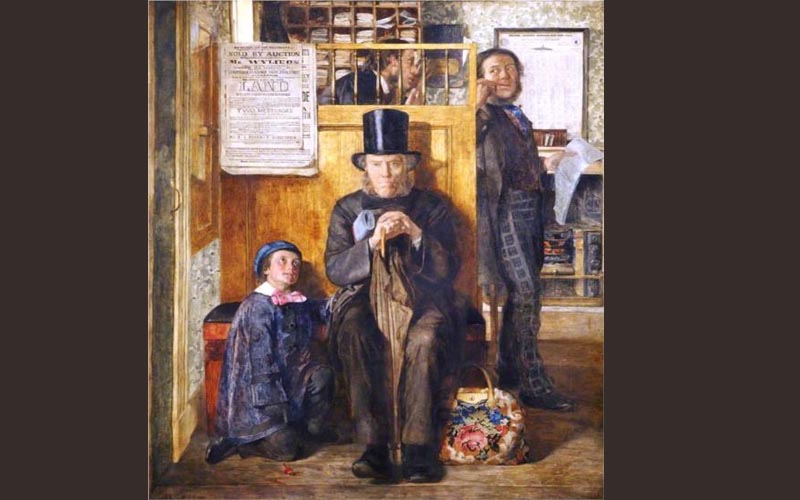
Img: Waiting for Legal Advice (James Campbell, 1857)
When Law and Psychoanalysis Met.
What the unconscious and irrational have to do with judicial functioning
Author: Rakesh Shukla
Psychoanalyst Rakesh Shukla argues that judges must remain alert to the effects of the unconscious on their judicial decision-making.
In an environmental law litigation over constructing a highway through a wildlife sanctuary, the judge was livid with rage. I was taken aback at the judge addressing the lawyer opposing the highway, in this case, me, as if I was the perpetrator of a crime. It appeared that it was left-wing extremism in the forested area which had enraged the judge. The case might have triggered in the judge’s psyche latent fears and anxieties of “revolution”, the annihilation of class enemies, anarchy and chaos. Likewise, in a matrimonial case of divorce on the grounds of cruelty, the judge might suddenly declare that the problem in the marriage was that the highly qualified doctor-wife had no time for her husband. In the absence of therapy sessions with the judge, we cannot know the reasons but likely there may be factors in his personal life impacting the judicial decision-making process. These are pointers towards the possibilities of factors not in the domain of the law playing a role in judicial decision-making.
It borders on blasphemy to mention the unconscious and the irrational in the same breath as the working of the legal system. The bedrock of law is rationality and logic. However, law and jurisprudential principles are mediated through the individual – who happens to adorn the bench – the “Judge”. Individuals by osmosis-like process seem to imbibe the biases, prejudices, and stereotypes of the religion, caste, race, community, gender, and sexual orientation of the community, which they have grown up in and remain unaware of them. Legal systems all over the world share the characteristic of not addressing this area crucial to the administration of justice.
Biases and prejudices permeate the entire edifice of law, thus undermining impartiality. The making or drafting of the legislation gets impacted by the persona of the draughtsman. The implementer, the investigator, the prosecutor, the lawyer, the judge, and the accused all carry and come into the proceedings with their baggage.
Presumption of innocence is the heart of criminal jurisprudence as conviction leads to incarceration and loss of liberty for the individual. Perhaps, impacted by morality, laws pertaining to narcotic and psychotropic substances often seem to reverse the burden of proof and place the onus on the accused to prove his/her innocence. The acts which constitute an offence are precisely defined in law. The ingredients of crimes like murder, theft, and abduction are delineated in detail not leaving room for ambiguity. In contrast, national security laws pertaining to terror threats, possibly impacted by anxieties and fears about the dismemberment of the motherland-nation, create offences like sedition, “terrorist act” and “disruptive act” giving a broad and vague definition which leaves much room for the exercise of arbitrary power by governments. In criminal law consent of an adult is the crucial factor in determining whether offences like abduction, kidnapping, and illegal confinement have been committed. Impacted by notions of sin, sex, and morality, in many jurisdictions, it is common to criminalize adult sex workers who have consented to do sex work.
Lofty principles like the presumption of innocence, burden of proof on the prosecution, and evaluation of evidence are impacted by the unconscious factors at play in the psyche of the judge. Statutory provisions apart, an accused whose appearance fits into the very stereotype of a drug addict in the mind of the judge engenders a “gut” feeling that “he is a drug addict and must have committed the theft” and in this in turn compromises and impacts “innocent till proven guilty” as well as the evaluation of evidence. Similarly, an individual accused of “terrorism” in appearance fitting the stereotype of a “terrorist” in the psyche of the judge impacts the integrity of the legal process.
The impact of the notions and beliefs of the judge impacting judicial functioning becomes stark in cases where the appellate court reverses the decision based on the same evidence. In the case of the assassination of former Prime Minister of India Rajiv Gandhi in 1991, the trial court convicted and sentenced to death twenty-six persons. The Supreme Court acquitted nineteen persons on the same evidence. In the absence of sessions with the judge – we cannot know with certainty – but factors like anxieties of dismemberment of the nation in the backdrop of the partition into Pakistan and India in 1947, love for mother and motherland, admiration for Rajiv Gandhi may have played a role and can make the difference between life and death of the accused individuals.
Judicial decisions can be appealed in higher courts on legal grounds. Allegations of bias against a judge are grounds for contempt in most jurisdictions. Self-correction by the judge is the only recourse in this area. A workshop or lecture cannot like a magic wand miraculously make a judicial officer impartial. It is a continuing process of alertness and conscious self-checks, striving to minimize the impact of biases, prejudices, and stereotypes on judicial decision-making.
Author Biography:
Rakesh Shukla is an analyst and legal practitioner. He engages with the complex interface of law, society and psychology, conducts workshops with judges on minimizing impact of biases, prejudices and stereotypes on the judicial decision making process and has designed and taught courses on law and psychology.

Return to
Everyday Psychoanalysis Blog